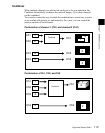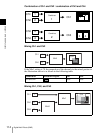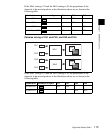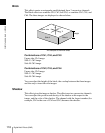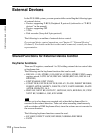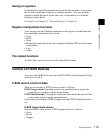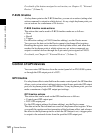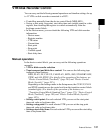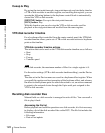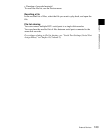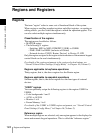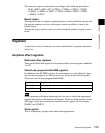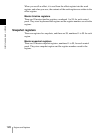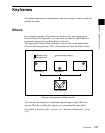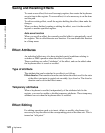
121External Devices
Chapter 1 DVS-9000 Functions
VTR/Disk Recorder Control
You can carry out the following manual operations and timeline settings for up
to 12 VTRs or disk recorders connected to a DCU.
• Controlling manually from the device control block (MKS-8031).
• Saving a start point, stop point, start delay time and variable speed in a data
register, then recalling the register to control automatically from the
keyframe control block.
• In the Device menu, you can check the following VTR and disk recorder
information:
– Device name
– Register number
– VTR status
– Current time
– Start point
– Stop point
– Variable speed
– Start delay time
Manual operation
In the device control block, you can carry out the following operations
manually.
• VTR or disk recorder selection
• Tape transport and disk drive control: You can use the following tape
transport control buttons:
REW, PLAY, FF, CUE UP, VAR PLAY, SHTL, JOG, STANDBY OFF,
STOP, and ALL STOP. (For details of the operation of the buttons, see
“Device Control Block (Trackball)” (page 183) and “Device Control
Block (Joystick)” (page 187).)
Depending on the settings made in the Setup menu, the CUE UP, PLAY
and STOP operations can be carried out from the transition control block
(standard type). (For details of the operation of the buttons, see
“Transition Control Block (Standard Type)” (page 173), “Device Control
Block (Trackball)” (page 183) and “Device Control Block (Joystick)”
(page 187).)
• Setting a start point: For each selected VTR you can set the start point
timecode value as keyframe data.
• Setting a stop point: For each selected VTR you can set the stop point
timecode value as keyframe data.
• Setting a start delay time: For each selected VTR you can set the start delay
time as keyframe data.



